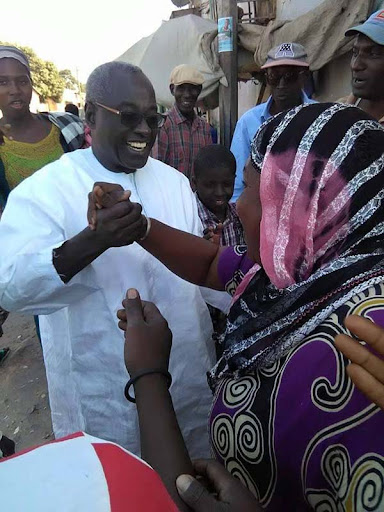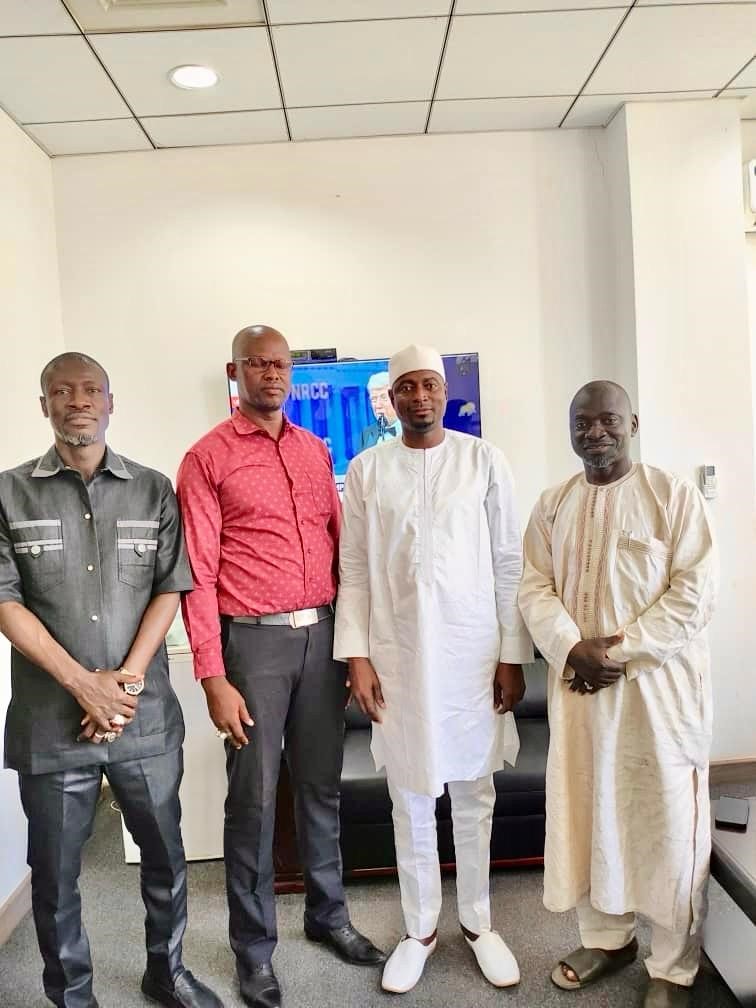By: Mariama Njie
Honorable Halifa Sallah, presidential candidate of the People’s Organization for Independence and Socialism (PDOIS) has vowed to eradicate poverty in the country and also promised to serve only one term in office if elected by Gambians on 4th December.
He said his party’s manifesto which is the Transformative Agenda stands to eradicate poverty, injustice and ignorance and to ensure that each Gambian irrespective of their socio-ethno linguistic origin, gender and religion lives a life of liberty, dignity and prosperity.
Quoting from the party’s manifestation which was revealed to the general public stated that it has seven component which are “the political component which aimed to provide instruments and institutions of services to all sovereign persons, the economic component aims to ensure that sovereign wealth is accumulated through public mining, fisheries and part of the national wealth at the central bank would be linked to the provision of interest free banking loans.
Meanwhile, Honorable Sallah explained to electorates that their Transformative Agenda calls for a cooperative state and said all countries that fought against colonialism/monarchies established sovereign republics.
“Sovereign Republic means the people constitute the depository of the sovereignty of the Republic,” Sallah said, adding “we have cooperative sovereignty of the people and based on that consent you have those who govern our affairs.”
“The primary task of the Cooperative State is to ensure that the community takes charge of its security through its own social cohesion. The State police service providers would be well trained, well remunerated and well-resource mobile units stationed at strategic places that would come to the aid of village security units to arrest and take accused persons before courts without the use of handcuffs or imprisonment in congested jails waiting for trial,” he told electorates.
Under a PDOIS led Government, he said in every village they will replicate the State structures such as health, education, security, fire and rescue service among others. He added that the villages will be trained to be able to administer those services.
He continued in his campaign that crime and criminality would be reduced by eradicating poverty and introducing community service as means for imposing penalties for crimes committed. No person would be sent to prison for crimes not associated with capital offences. The standing army would no longer be an instrument of coercion or specialized killing machine that would assist tyrants to engage in any form of domination at home or abroad.
He went on saying that units would be established to engage in duties such as, industrial fisheries, wharf construction, boat building, construction of state and community infrastructure and amenities and would fill any gap in the rendering of services to the population, in the spirit of love of and service to country and people. And there will be constitutional evolution to establish a two-term limit for presidency.
According to him, new constitution will involve the people in all branches of the state. The new constitution will establish a Presidency Advisory Committee that will be selected by the civil society that will meet the Cabinet quarterly to indicate the general concerns of the population. The Committee will have the right to be heard at the National Assembly to table their report.
Each Gambian is a depository of the sovereignty of their motherland so “there is no minority in this country. Everybody belongs to the majority and the majority constitutes the citizenry. Anybody who decides to belong to any group you are seceding from the Republic and you would constitute a minority because the citizens are always the majority. That is what we are going to inculcate in the minds of our citizens,” Sallah explained.
“The machinery that the monarch established to oppress people will be dismantled and therefore it will be replaced by new instruments,” Sallah said.
He said this means the army will no longer be seen as a killer machine used by tyrants to oppress their people.
“We will transform that army into the most disciplined workforce in human history,” he said.
He explained that the army will be used to address the gaps that exist in the development process of the country. He said the army will be trained to have skills such as the area of engineering to construct roads, bridges and schools among others to be able to construct all the country needs for its development. He added that when soldiers are dismissed from service, they do not have any means of survival – they go to private security institutions to survive.
“We will put an end to that. Our army will be a school for development. Our police force will be mobile,” he said.
He said the idea is to build a police force that is linked with the community, linked with the aspiration of the community and there to serve the community.
“That is how we are going to dismantle what is inherited from the colonial order and build what is necessary in a cooperative state,” he said.
Sallah said for non-capital offences, the offender will do community service rather than being sent to jail because the aim is to move to rehabilitative justice rather than retributive justice.
He said the new cooperative state would require a new constitution adding the citizenry will be encouraged to look at the history of constitutional development in the country and how the country evolved to what it is today and what must be done to ensure there is an end to self-perpetuating rule.
“Currently only National Assembly members and Ministers can table motions before the National Assembly. The Constitution should change. Certain institutions that will represent the voice of the people will be given an audience to be able to address the National Assembly regarding the concerns of the people,” he said.
“We will establish a system where men and women will be equal in Cabinet representation. Not only that, we advocate for proportionate representation so that that equality will be reflected at the level of the National Assembly and the level of the councils,” he said.
Sallah said the people are told they own the sea and land, but poverty still remains. He asked the question how the poverty of the people can end.
The economic base of The Gambia comprises agriculture, industry and services with a GDP amounting to 108.8 billion dalasis for 2021. The GDP is very vulnerable to shocks due to the fragility of the economy.
In addition, he said The Gambia is in a state of debt distress with the debt burden rising to 81.8 billion dalasis in 2021; adding, the debt burden requires payment of debt service charges amounting to 5.7 billion dalasis per annum despite the rescheduling of debt repayment. Sallah submitted that the debt burden is unsustainable.
He said the eradication of poverty could only come through the transformation of the economic base; adding, the accumulation of sovereign national wealth would promote production and consumption-based welfare as well as give support to the expansion of the public, private, cooperative and informal sectors of the economy in accordance with the economics of scale and general welfare.
“There must be a linkage between agricultural production, processing and marketing to ensure food self-reliance, security and import substitution,” he said.
Sallah said the Gambia currently has 550,000 hectares of arable land which makes it possible for The Gambia to produce the rice and grains we need. He added that only 57 percent of the arable land is being utilized. He said the country needs between 200,000 to 398,000 metric tons of rice per annum but is producing between 22,000 to 57,000 metric tons per annum.
“We are spending between 2 to 4 billion dalasis on rice importation [per annum]. We need to reverse the process of being an import dependent nation. Since the First Republic we import most of the goods we consume,” Sallah said.
“We must apply the principle of import substitution by producing what we are importing and reduce import cost while expanding our export to ensure a balanced and proportionate development in trade with our partners,” he said.
We will tell our partners that when you are coming to the Gambia you are helping to eradicate poverty. We will be able to set up a commission that will be able to identify all the products that the tourists would want to buy and then the Cooperative Bank will assist the people to produce those products, he stated.
He said if 350,000 tourists visit the Gambia and spend one hundred dollars to buy the product that means you are contributing nothing less than one and a half billion dollars to the Gambian economy annually.
“We want to build an economy that is people centered,” he said.
However, Sallah continued telling members of the public that 2016 was the liberation of the Gambian people. Now they own themselves and cannot be intimidated by anybody on the planet.





